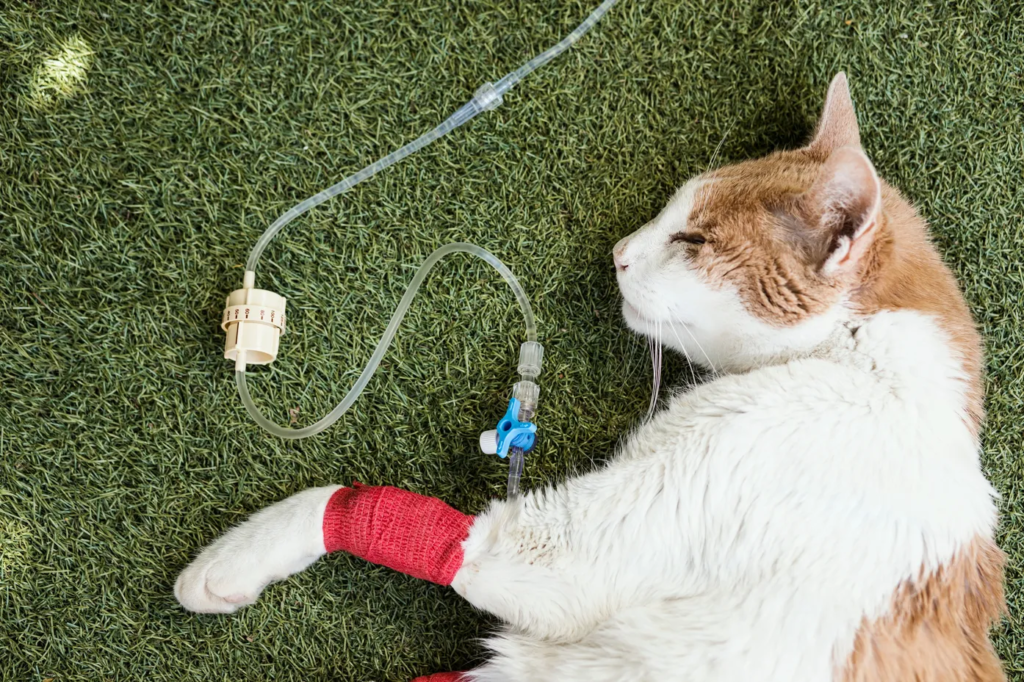Managing chronic health conditions in cats is a critical aspect of ensuring their long-term well-being and quality of life. Chronic diseases such as diabetes and kidney disease require ongoing attention and care. Understanding these conditions, their management, and how to support your feline friend effectively can make a significant difference in their health and comfort. Here’s a comprehensive guide on managing chronic health conditions in cats.

1. Understanding Common Chronic Conditions
1. Diabetes Mellitus:
Diabetes mellitus in cats occurs when the body cannot produce or use insulin effectively, leading to high blood sugar levels. Symptoms include:
- Increased Thirst and Urination: Cats may drink and urinate more frequently.
- Weight Loss: Despite having a good appetite, affected cats may lose weight.
- Lethargy: Reduced energy and activity levels can be observed.
2. Chronic Kidney Disease (CKD):
CKD is a progressive loss of kidney function over time. Common signs include:
- Increased Thirst and Urination: Similar to diabetes, CKD often causes increased water intake and urination.
- Weight Loss and Poor Coat Condition: Cats may lose weight and have a dull, unkempt coat.
- Vomiting and Loss of Appetite: Gastrointestinal symptoms can also occur.
3. Hyperthyroidism:
Hyperthyroidism is an overproduction of thyroid hormones. Symptoms may include:
- Weight Loss: Despite a good appetite, affected cats may lose weight.
- Increased Appetite: Cats may eat more than usual.
- Restlessness and Rapid Heartbeat: Increased activity and a rapid heart rate are common.
2. Managing Diabetes Mellitus
1. Insulin Therapy:
- Insulin Injections: Most diabetic cats require daily insulin injections. Your veterinarian will guide you on the correct dosage and injection techniques.
- Monitoring Blood Sugar: Regular blood glucose monitoring at home or via veterinary visits is essential to adjust insulin levels and ensure effective management.
2. Diet and Nutrition:
- Specialized Diets: Your vet may recommend a high-protein, low-carbohydrate diet to help regulate blood sugar levels. Avoid giving your cat treats or table scraps that can interfere with their diet.
3. Regular Veterinary Check-ups:
- Routine Monitoring: Frequent vet visits are necessary to monitor your cat’s blood glucose levels and adjust treatment plans as needed. Regular check-ups also help manage any potential complications.
3. Managing Chronic Kidney Disease
1. Dietary Management:
- Specialized Diets: Renal diets are formulated to reduce the workload on the kidneys and manage symptoms. These diets often have lower protein and phosphorus levels to support kidney function.
- Hydration: Ensuring your cat drinks plenty of water is crucial. Wet food can also help increase fluid intake.
2. Medications and Supplements:
- Prescription Medications: Your vet may prescribe medications to manage symptoms or slow disease progression. These may include phosphate binders, anti-nausea medications, or medications to control blood pressure.
- Supplements: Omega-3 fatty acids and other supplements may be recommended to support kidney function and overall health.
3. Regular Monitoring:
- Blood Tests: Frequent blood tests are necessary to monitor kidney function and adjust treatment. Your vet will track markers such as blood urea nitrogen (BUN) and creatinine levels.
4. Managing Hyperthyroidism

1. Medications:
- Anti-Thyroid Drugs: Medications like methimazole help manage hyperthyroidism by reducing thyroid hormone production. Regular monitoring is required to adjust dosages and manage side effects.
- Transdermal Options: If oral medications are difficult, your vet may offer transdermal options that are applied to the skin.
2. Diet:
- Prescription Diets: Special diets low in iodine can help manage hyperthyroidism. These diets can limit the production of thyroid hormones.
3. Surgery and Radioactive Iodine Therapy:
- Surgical Options: In some cases, surgical removal of the thyroid gland may be necessary.
- Radioactive Iodine Treatment: This treatment targets and destroys the overactive thyroid tissue, offering a potential cure for hyperthyroidism.
5. General Tips for Managing Chronic Conditions
1. Routine Care:
- Consistency: Adhering to treatment schedules, medication doses, and dietary recommendations is crucial for managing chronic conditions effectively.
- Monitoring Symptoms: Keep a close watch on your cat’s symptoms and behavior. Report any changes or new symptoms to your vet promptly.
2. Comfort and Quality of Life:
- Comfort Measures: Ensure your cat is comfortable and has a stress-free environment. Provide a quiet, cozy space for them to rest.
- Supportive Care: Regular grooming, maintaining a clean environment, and providing emotional support can enhance your cat’s quality of life.
3. Communication with Your Vet:
- Open Dialogue: Maintain open communication with your veterinarian. Regularly discuss your cat’s progress, treatment effectiveness, and any concerns you may have.
Conclusion
Managing chronic health conditions in cats requires a proactive approach involving medical treatment, dietary management, and regular veterinary care. By understanding the specific needs of conditions such as diabetes, kidney disease, and hyperthyroidism, you can help your feline friend live a comfortable and fulfilling life. Consistent care, early intervention, and strong communication with your vet are key components in managing chronic health issues effectively. With the right strategies, you can ensure your cat enjoys a high quality of life despite their chronic condition.


